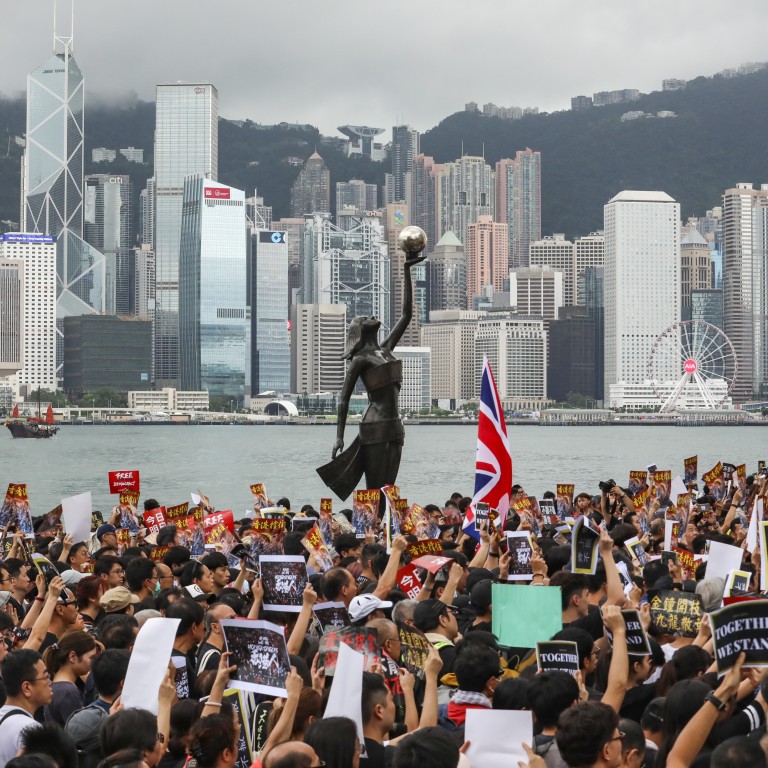The eyes of the world are on Hong Kong’s
extradition bill protests. The millennial-led demonstrations have matured into a
global and unstoppable movement. Karl Marx said history repeats itself, “the first time as tragedy, the second time as farce”. This is not the first time Hong Kong has faced a huge social and political crisis.
Fifteen years before the handover, Hongkongers realised that their way of life might no longer be preserved. Across sectors, there was a loss of faith in the city. The stock market plummeted and the Hong Kong dollar exchange rate to the US dollar
crashed. The panic did not stop until the Chinese and British governments drafted the
Sino-British Joint Declaration. The promise of “one country, two systems” and “Hong Kong people ruling Hong Kong” stabilised society.
In theory, there are still 28 years until the pledge of Hong Kong’s economic and political system remaining “unchanged for 50 years” runs out. However, going by the disquiet before the handover, the next big confidence crisis is likely to be in 2033, given that a Legislative Council election will be held in 2032. Optimistically, that will be the final countdown to 2047 – the endgame.
In fact, the Chinese and Hong Kong governments do not believe that the promise that Hong Kong will “remain unchanged for 50 years” must be kept until 2047, although there are many practical problems to be solved from land premiums and bank mortgages to international treaties. Going by the current political instability, it is very likely that 2020 will be the endgame for “one country, two systems.”
Leung Chun-ying was a deeply unpopular chief executive, who undermined Hong Kong’s core values. Although Leung did not stand
for re-election, the increasing interference of Beijing’s
liaison office in Hong Kong’s administration has opened a Pandora’s box.
Chief Executive Carrie Lam Cheng Yuet-ngor’s government has been a puppet of Beijing since she took office. In line with the mission of legislating Article 23, Lam naively believed that she could use the
Taiwan murder case as a decoy to amend Hong Kong’s extradition laws, setting off the large-scale anti-extradition movement.
Lam’s inability to lead Hong Kong is evident. Talent and capital have already started to flee. Goldin Financial
rescinding its bid of HK$11.1 billion (US$1.42 billion) for the Kai Tak seafront plot is not an isolated incident. Anticipating competition from virtual banks, HSBC
recently scrapped the minimum balance on savings accounts to stabilise its deposit base. Last month, Deutsche Bank cut a large number of jobs in Hong Kong as part of its global restructuring. Many multinational corporations are adopting similar strategies.
Moody’s rating agency identified Hong Kong’s deteriorating economic autonomy in the run-up to 2047 as a risk that could result in a lowering of the city’s credit rating in the future. This would inevitably lead to capital outflows. Unlike in 1997, the exodus of capital and people will not be mild. Hundreds of thousands of Hongkongers who have
foreign passports or right of abode in other countries could leave.
In the United States, members of Congress
have reintroduced the bipartisan Hong Kong Human Rights and Democracy Act. Under the act, if China fails to ensure Hong Kong’s high degree of autonomy, the US could revoke Hong Kong’s special status under American law. If other Western countries follow suit, it would be the end of Hong Kong.
Multinational corporations will move their Asia-Pacific headquarters to Singapore. Hong Kong would no longer play the irreplaceable role of international financial centre. “Nylonkong”, a term coined by Time magazine to refer to the financial hubs of New York, London and Hong Kong, would be replaced by “Nylongpore”. Since Singapore is also a bilingual country and an English common law jurisdiction, it is only a matter of time before it takes over from Hong Kong as the international financial centre in the Asia-Pacific.
The only way for the Chinese and Hong Kong governments to turn the situation around is to face the fact that
universal suffrage is necessary. Giving Hongkongers true democracy and formulating beneficial socioeconomic policies are the solutions to the current crisis. This is the only way to prevent the tragedy from repeating itself. Otherwise, the consequences will be severe.
Albert Cheng King-hon is a political commentator. [email protected]


